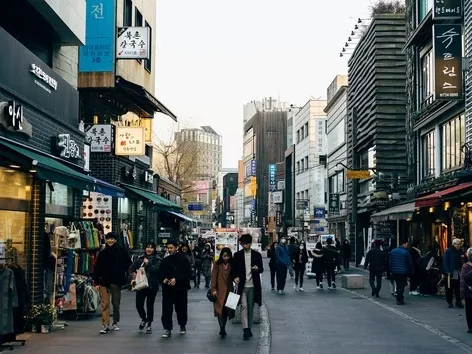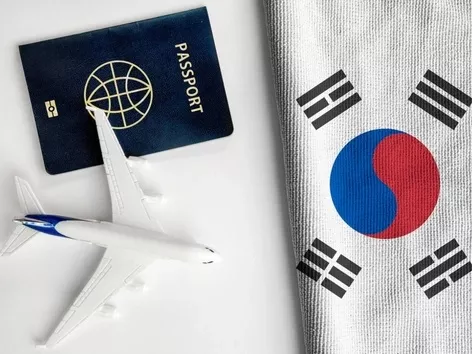Medicine in South Korea for foreigners: insurance, hospitals and useful tips
Table of contents
- Healthcare system in South Korea
- Health insurance for foreigners in South Korea
- Visiting a doctor in South Korea and traditional medicine
- Do foreigners receive free healthcare in South Korea?
- What kind of treatment do expats pay for themselves in South Korea?
- Can tourists receive free treatment in South Korea?
- Best Hospitals for Expats and Tourists in South Korea
- Buying Medicines and Prescription Rules in South Korea
- Vaccinations in South Korea
- Medical risks in South Korea and tips
- Emergency numbers in South Korea

South Korea offers one of the most modern and efficient healthcare systems in the world, making the country attractive to both locals and foreigners. Learn about the South Korean healthcare system in 2025: health insurance for foreigners, best hospitals, traditional medicine, cost of services and tips for tourists and expats
South Korea is known not only for its technological achievements and economic development, but also for its high level of medical system, which is recognized as one of the best in the world. Highly qualified doctors, modern equipment and a combination of public and private medical institutions provide effective and affordable care for local residents and foreigners, including citizens of Uzbekistan, Turkmenistan and Kyrgyzstan. For those planning a long stay or a tourist trip to the country, understanding the specifics of healthcare becomes a key factor in a safe and comfortable stay.
To make your trip or long stay in South Korea as safe as possible, we recommend taking out international medical insurance from Visit World! It covers unforeseen expenses for treatment, doctor's consultations and repatriation, providing peace of mind and financial protection in any situation.
Healthcare system in South Korea
South Korea is deservedly considered a country with one of the best healthcare systems in the world. It combines modern medical infrastructure, advanced technology and highly qualified doctors who are trained according to international standards. This makes the country not only attractive for its own citizens, but also a popular destination for medical tourism.
The modern system began to develop actively since the 1950s, and today it is a balanced model that includes public and private institutions. The main element is the National Health Insurance (NHI) system, which is managed by the National Health Insurance Service (NHIS). Insurance is mandatory and covers most of the costs of medical services - from doctor consultations to surgical operations.
Thanks to NHI, patients get access to a wide range of services at relatively low prices. For example, a visit to a doctor or examination costs several times cheaper than in the USA or Western European countries. At the same time, the level of hospital equipment and the quality of medical services remain at the highest level.
A feature of the South Korean system is the active participation of the private sector: most hospitals and clinics are privately owned, but the state controls tariffs and ensures a transparent payment system. This allows maintaining a balance between the quality of services and accessibility for the population.
The same rules apply to foreigners: residents are required to join the NHI, and short-term visitors can use medical services on a paid basis or take out private insurance. Thanks to this, even foreign students and workers can get full access to quality medical care.
Available ways to obtain a residence permit in South Korea in 2025 in this article.
Health insurance for foreigners in South Korea
In South Korea, all foreigners who live in the country for more than 6 months are required to join the National Health Insurance (NHI) system. The cost of contributions depends on your employment status and income level: on average, it is about 110,000 Korean won per month (approximately 80 euros).
If you are employed under a local employment contract, your employer automatically registers you in the system. In this case, the company pays half of the contributions, and 5% of your salary goes to finance health insurance.
If you are self-employed or an entrepreneur, you need to apply for insurance yourself after receiving an Alien Registration Card (ARC). This card is mandatory for anyone staying in the country for more than 90 days. To obtain it, you need to go to the nearest immigration office with a set of documents, after which you can register with the NHIS. The amount of contributions in this case is calculated depending on income.
The NHI system usually covers 50–80% of the costs of medical care, including consultations with doctors, specialists and hospitalization. However, for greater security, it is recommended to take out international medical insurance before your trip. It will provide additional coverage, including repatriation costs, and allow you to use medical services with peace of mind in any situation.
Choosing the best health insurance plan is an important decision in the life of every expat, because rushing and choosing the wrong policy can be costly. This article provides a step-by-step guide to help you choose the right health insurance.
Visiting a doctor in South Korea and traditional medicine
In large cities in South Korea, most doctors are fluent in English, which makes communication easier for foreigners. However, it is worth remembering that not all medical professionals can speak English, especially in smaller cities and rural areas.
The cost of medical care remains affordable. A consultation with a therapist costs an average of 10 to 15 euros (13,600–20,000 Korean won), which is significantly cheaper than in many Western countries.
Traditional medicine occupies a special place in Korean medicine. Clinics offer a variety of treatments, such as herbal medicine, acupuncture, cautery, aromatherapy, and other methods. Traditional medicine is widely practiced in both large cities and rural areas, and is often combined with modern treatments.
Do foreigners receive free healthcare in South Korea?
The universal healthcare system does not provide for completely free treatment. The cost of medical services depends on the type of treatment and the length of stay.
Employees pay about 5% of their income to the NHIS, with part of the contribution being paid by the employer.
Self-employed residents pay contributions based on income and the number of family members.
Low-income families may be exempt from payments.
What kind of treatment do expats pay for themselves in South Korea?
- Inpatient treatment: 10–20% of the bill
- Outpatient care: 40–50% of the cost, plus consultation fees
Can tourists receive free treatment in South Korea?
Even short-term visitors can visit hospitals, but they are likely to have to pay for services. International health insurance can help cover unexpected medical expenses while traveling.
Best Hospitals for Expats and Tourists in South Korea
South Korea is known for its strong healthcare system and modern hospitals, which are among the best in the world. According to the OECD, the average life expectancy of South Koreans is 82.7 years, higher than the organization’s average of 80.8 years.
If hospitalized, patients can expect high-quality care, including laboratory tests, imaging, surgical and non-surgical treatments, medications, and emergency care. With comprehensive health insurance and relatively affordable prices, the best hospitals in South Korea are an attractive choice for foreigners and expats.
The country has about 3,200 hospitals, which is one of the reasons why South Korea ranked 18th in the Global Health Innovation Index 2022 and 3rd among the best healthcare systems in the world by 2024.
Many of the leading hospitals are affiliated with universities and medical schools, providing a high level of expertise, innovative technologies, and advanced treatment methods. The most famous of them are located in Seoul and major cities:
- Asan Medical Center – Seoul, Songpa-Gu, 88 Olympic-RO 43-GIL; email: [email protected]
- Seoul National University Hospital – Seoul, Jongno-gu, 101 Dehak-ro; email: [email protected]
- Samsung Medical Center – Seoul, Gangnam-gu, 81 Irwon-Ro; email: [email protected]
- Severance Hospital – Yonsei University – Seoul, Sodaemun-gu, 50-1 Yonsei-Ro
- Seoul National University Bundang Hospital – Seongnam-si, Gyeonggi-do, 82 Gumi-ro; email: [email protected]
Among them, Asan Medical Center is considered the most modern hospital in the country, receiving a rating of 97.76% according to Newsweek.
Many medical centers offer services for foreign patients, including English-speaking doctors and international departments. This makes medical services in South Korea convenient and accessible even for those who do not speak Korean.
Buying Medicines and Prescription Rules in South Korea
In South Korea, access to medicines is organized through a pharmacy network (약국, yak-guk). Most over-the-counter medicines, such as cold, headache, fever, diarrhea and vitamins, can be purchased without a prescription at pharmacies. These pharmacies are usually located in residential areas, shopping areas and near hospitals.
However, to purchase prescription medicines, such as antibiotics, hormonal drugs or sleeping pills, you need to see a doctor and get a prescription.
Helpful tip: If you are traveling with medication, especially painkillers or sleeping pills, be sure to bring a doctor's prescription in English. This will help avoid problems at customs.
Vaccinations in South Korea
Officially, vaccinations are not mandatory for entry into South Korea. However, it is recommended to have up-to-date vaccinations for diphtheria, tetanus, polio, hepatitis B and measles.
Depending on your itinerary and length of stay, additional vaccinations for Japanese encephalitis, rabies, typhoid and hepatitis A may be recommended.
Please note: In 2025, 52 measles cases were reported in South Korea, the highest number in six years. The diseases are mostly imported from other countries, so it is important to have up-to-date vaccinations before traveling.
Medical risks in South Korea and tips
- Malaria: Malaria is only present in some northern regions (Gyeonggi and Gangwon provinces). If you are planning to stay in these areas from May to September, it is recommended to use repellents and wear long clothing to protect against mosquito bites.
- Avian influenza (H1N1): Outbreaks of avian influenza occur periodically. It is recommended to avoid contact with poultry and birds, especially in markets.
- Japanese Encephalitis: This is a viral disease transmitted by mosquito bites. The risk of infection increases in rural areas, especially from May to October
- Rabies: Although the risk is low, it is recommended to avoid contact with animals, especially wild ones, and to seek medical attention if bitten.
Emergency numbers in South Korea
- Ambulance and fire department: 119
- Police: 112
- English-speaking medical call center: 1339
South Korea's healthcare system combines universal insurance, accessibility of medical services, and high standards of treatment. The state and private institutions work in tandem, providing the population and foreigners with a wide range of services at reasonable prices. When planning a trip or moving to a country, it is worth familiarizing yourself with the rules of medical insurance, vaccinations and the features of traditional and modern medicine in advance to get maximum protection and comfort in any situation.
To make your treatment abroad as convenient and safe as possible, Visit World offers a “Guide to Treatment” manual, which contains all the necessary information for foreign patients:
- Visa fee and application processing time – find out how much it costs to submit documents and how long it will take to obtain a visa.
- Full list of documents – a clear list of what is needed to apply for a medical visa.
- Life hacks and tips – useful recommendations for a comfortable stay and planning a trip.
- Rules for filling out a visa application form – detailed instructions to avoid mistakes and delays.
- Step-by-step instructions for applying for a visa – from filling out the application form to going through a visa interview, everything is structured for easy and quick processing.
This guide will help you go through all the bureaucratic stages without stress and focus on the main thing - quality treatment in South Korea.
Reminder! Life in South Korea will provide expats with many prospects, but it also has its price. When planning to move here, you should be prepared for certain advantages and disadvantages. We have already told you what the pros and cons of living in South Korea are and what to pay attention to when planning to move to the country.
Products from Visit World for a comfortable trip:
Checklist for obtaining a visa and necessary documents in South Korea;
Legal advice on immigration to South Korea;
Travel insurance for foreigners in South Korea;
Medical insurance all over the world.
We monitor the accuracy and relevance of our information. Therefore, if you see any error or discrepancy, please write to our hotline.
Frequantly
asked questions
Can a foreigner work as a doctor in Korea?
How to get a medical visa to Korea?
Is medical care free in South Korea?
Recommended articles
2 min
Treatment
Medical Tourism in Malaysia in 2025: A Detailed Guide for Patients from Around the World
Malaysia has become one of the centers of global medical tourism: high-quality medicine, international clinics, affordable prices and comfortable treatment conditions. Find out which destinations are popular among foreign patients, how much treatment costs, how to organize a trip, which clinics to choose and how to combine procedures with a vacation at sea
13 Sep. 2025
More details3 min
Work
Jobs for expats in South Korea: available types of work visas, the permit procedure and useful tips
Working in South Korea offers an exciting immersion in a dynamic mix of tradition and innovation. With its rich cultural heritage and fast-growing economy, the country offers a unique experience for both local and foreign professionals. Find out what types of work visas are available in the country and what the procedure for obtaining a permit is
09 Aug. 2024
More details1 min
Travels
South Korea is considering a pilot program that would allow Chinese tour groups to enter without visas. The main goal of this measure is to stimulate tourism and further promote South Korea's economic growth. Find out what is already known about visa-free travel from China to South Korea
01 Jan. 2025
More details1 min
Travels
South Korea has introduced an electronic arrival card, replacing traditional paper forms for travelers, effective February 24, 2025. The initiative aims to simplify the entry process and increase the efficiency of immigration procedures. Find out what a Korean electronic arrival card is, who needs it, and how to apply for one.
02 Mar. 2025
More detailsAll materials and articles are owned by VisitWorld.Today and are protected by international intellectual property regulations. When using materials, approval from VisitWorld.Today is required.
